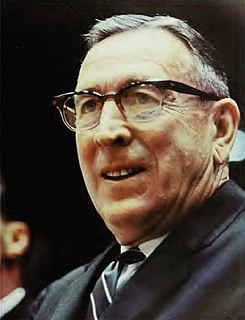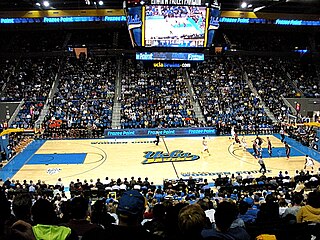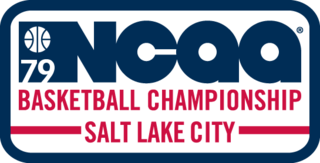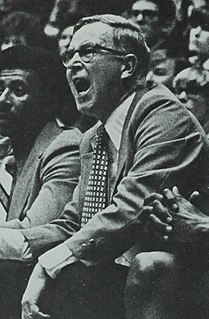
John Robert Wooden was an American basketball coach and player. Nicknamed the "Wizard of Westwood", he won ten National Collegiate Athletic Association (NCAA) national championships in a 12-year period as head coach for the UCLA Bruins, including a record seven in a row. No other team has won more than four in a row in Division I college men's or women's basketball. Within this period, his teams won an NCAA men's basketball record 88 consecutive games. Wooden won the prestigious Henry Iba Award as national coach of the year a record seven times and won the AP award five times.

Edwin W. Pauley Pavilion, commonly known as Pauley Pavilion, is an indoor arena located in the Westwood Village district of Los Angeles, California, on the campus of UCLA. It is home to the UCLA Bruins men's and women's basketball teams. The men's and women's volleyball and women's gymnastics teams also compete here.

Elvin Ernest Hayes, nicknamed "the Big E", is an American retired professional basketball player and radio analyst for his alma-mater Houston Cougars. He is a member of the NBA's 50th and 75th anniversary teams, and an inductee in the Naismith Memorial Basketball Hall of Fame. Known for both his offensive and defensive prowess, Hayes is often regarded as one of the best power forwards in NBA history. Hayes is also known for his longevity, being third all-time in NBA minutes played, and missing only nine games during his 16 season career.

Lucius Oliver Allen, Jr. is an American former professional basketball player. He is one of only a select few players to have won at least one state championship, collegiate national championship, and NBA championship. He also scored the first points in the history of Pauley Pavilion.
The 1964 NCAA University Division Basketball Tournament involved 25 schools playing in single-elimination play to determine the national champion of men's NCAA Division I college basketball in the United States. It began on March 9, 1964, and ended with the championship game on March 21 in Kansas City, Missouri. A total of 29 games were played, including a third place game in each region and a national third place game.

The 1995 NCAA Division I men's basketball tournament involved 64 schools playing in single-elimination play to determine the national champion of men's NCAA Division I college basketball. It began on March 16, 1995, and ended with the championship game on April 3 at the Kingdome in Seattle, Washington. A total of 63 games were played.
The 1967 NCAA University Division Basketball Tournament involved 23 schools playing in single-elimination play to determine the national champion of men's NCAA Division I college basketball. It began on Saturday, March 11, and ended two weeks later with the championship game on March 25 in Louisville, Kentucky. A total of 27 games were played, including a third-place game in each region and a national third-place game.
The 1969 NCAA University Division men's basketball tournament involved 25 schools playing to determine the national champion of men's NCAA Division I college basketball. It began on March 8, 1969, and ended with the championship game on March 22 in Louisville, Kentucky. Including consolation games in each of the regions and an overall consolation game, a total of 29 games were played.
The 1970 NCAA University Division Basketball Tournament involved 25 schools playing in single-elimination play to determine the national champion of men's NCAA Division I college basketball. It began on March 7, 1970, and ended with the championship game on March 21 in College Park, Maryland. A total of 29 games were played, including a third place game in each region and a national third place game. This tournament was notable for the number of small schools that reached the Sweet 16, Elite 8, Final 4, and Championship Game. Another notable aspect of the tournament was that Marquette became the first team to turn down an announced NCAA Tournament bid for the National Invitation Tournament. Coach Al McGuire took issue with being seeded in the Midwest regional instead of the geographically closer Mideast. They were replaced in the field by Dayton. As a result of this action, the NCAA forbid its members from playing in other postseason tournaments if offered an NCAA bid.

The 1971 NCAA University Division Basketball Tournament involved 25 schools playing in single-elimination play to determine the national champion of men's NCAA Division I college basketball. It began on March 13, 1971, and ended with the championship game on March 27 in Houston, Texas. A total of 29 games were played, including a third place game in each region and a national third place game.

The 1972 NCAA University Division Basketball Tournament involved 25 schools playing in single-elimination play to determine the national champion of NCAA University Division college basketball. It began on Saturday, March 11, and ended with the championship game in Los Angeles on Saturday, March 25. A total of 29 games were played, including a third place game in each region and a national third place game.

The 1973 NCAA University Division Basketball Tournament involved 25 schools playing in single-elimination play to determine the national champion of men's NCAA University Division college basketball. It began on Saturday, March 10, and ended with the championship game on Monday, March 26, in St. Louis, Missouri. A total of 29 games were played, including a third place game in each region and a national third place game.

The 1979 NCAA Division I Basketball Tournament involved 40 schools playing in single-elimination play to determine the national champion of men's NCAA Division I college basketball. It began on March 9 and ended with the championship game on March 26 in Salt Lake City. A total of 40 games were played, including a national third-place game. This was the tournament's only edition with forty teams; the previous year's had 32, and it expanded to 48 in 1980. The 1979 Indiana State team was the most recent squad to reach a national title game with an undefeated record, holding that distinction for 42 years until the 2021 Gonzaga Bulldogs team won a 93-90 OT national semifinal over UCLA to reach the 2021 title contest vs. Baylor with a 31-0 record.

The 1980 NCAA Division I Basketball Tournament involved 48 schools playing in single-elimination play to determine the national champion of men's NCAA Division I college basketball. It began on March 6th, 1980, and ended with the championship game on March 24th at Market Square Arena in Indianapolis. A total of 48 games were played, including a national third-place game.

In men's college basketball, the Game of the Century was a historic National Collegiate Athletic Association (NCAA) game between the Houston Cougars and the UCLA Bruins played on January 20, 1968, at the Astrodome in Houston, Texas. It was the first NCAA regular season game broadcast nationwide in prime time. It established college basketball as a sports commodity on television and paved the way for the modern "March Madness" television coverage.

The UCLA Bruins men's basketball program represents the University of California, Los Angeles in the sport of men's basketball as a member of the Pac-12 Conference. Established in 1919, the program has won a record 11 NCAA titles. Coach John Wooden led the Bruins to 10 national titles in 12 seasons, from 1964 to 1975, including seven straight from 1967 to 1973. UCLA went undefeated a record four times. Coach Jim Harrick led the team to another NCAA title in 1995. Former coach Ben Howland led UCLA to three consecutive Final Four appearances from 2006 to 2008. As a member of the AAWU, Pacific-8 and then Pacific-10, UCLA set an NCAA Division I record with 13 consecutive regular season conference titles between 1967 and 1979 which stood until passed by Kansas in 2018. UCLA is scheduled to join the Big Ten Conference in 2024.

Maurice E. John was an American college basketball coach at Drake University and Iowa State University. John is the all–time wins leader at Drake and led the Bulldogs to the NCAA Final Four in 1969. In his 28–year coaching career, John had a 528–214 record. John died of cancer at age 55 in 1974, while coaching at Iowa State.

The 1967–68 UCLA Bruins men's basketball team won a second consecutive NCAA National Championship, the fourth in five years under head coach John Wooden, with a win over North Carolina.
The 1968–69 UCLA Bruins men's basketball team won an unprecedented third consecutive NCAA National Basketball Championship, the fifth in six years under head coach John Wooden with a win over Purdue, coach Wooden's alma mater. The Bruins opened with 25 wins, on a 41-game winning streak, but lost the regular season finale to rival USC on March 8, which snapped a home winning streak of 85 games.
The 1967–68 NCAA University Division men's basketball season began in December 1967, progressed through the regular season and conference tournaments, and concluded with the 1968 NCAA University Division Basketball Tournament Championship Game on March 23, 1968, at Los Angeles Memorial Sports Arena in Los Angeles, California. The UCLA Bruins won their fourth NCAA national championship with a 78–55 victory over the North Carolina Tar Heels.












